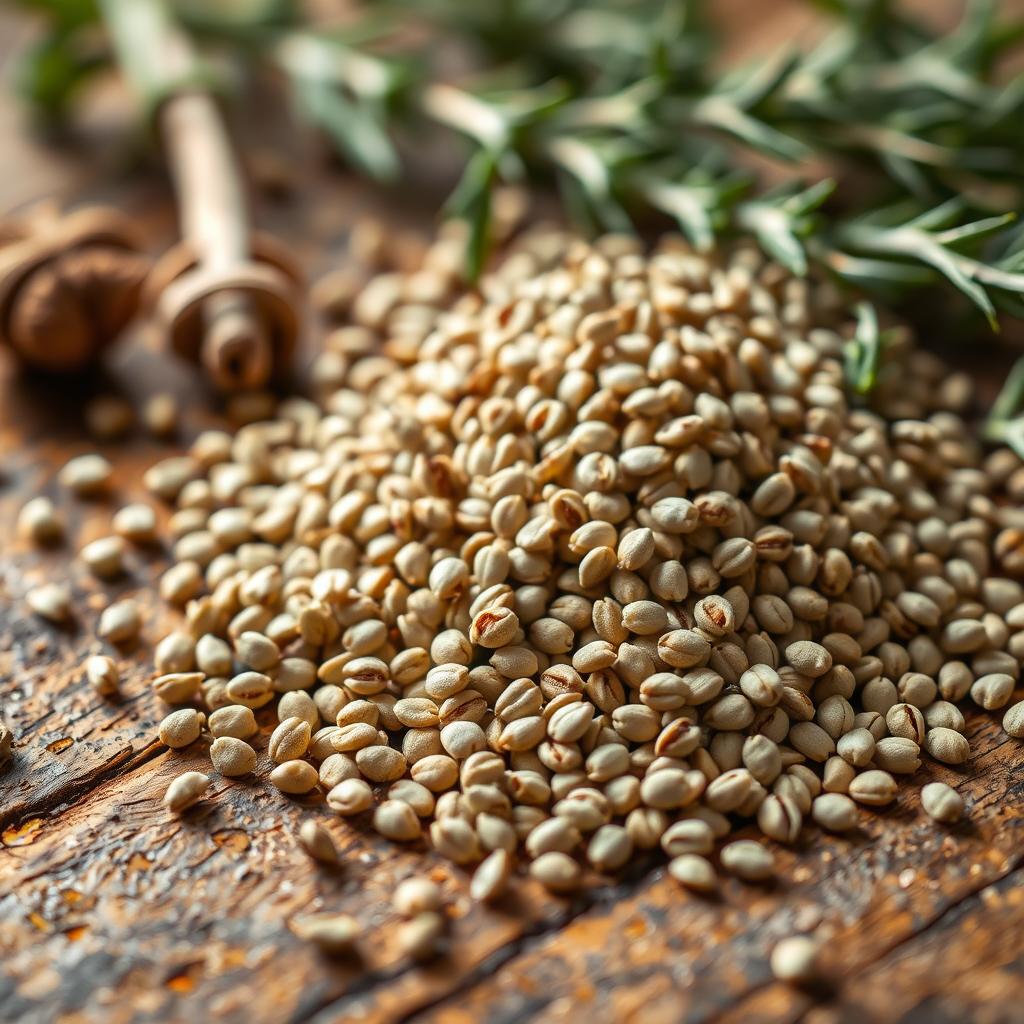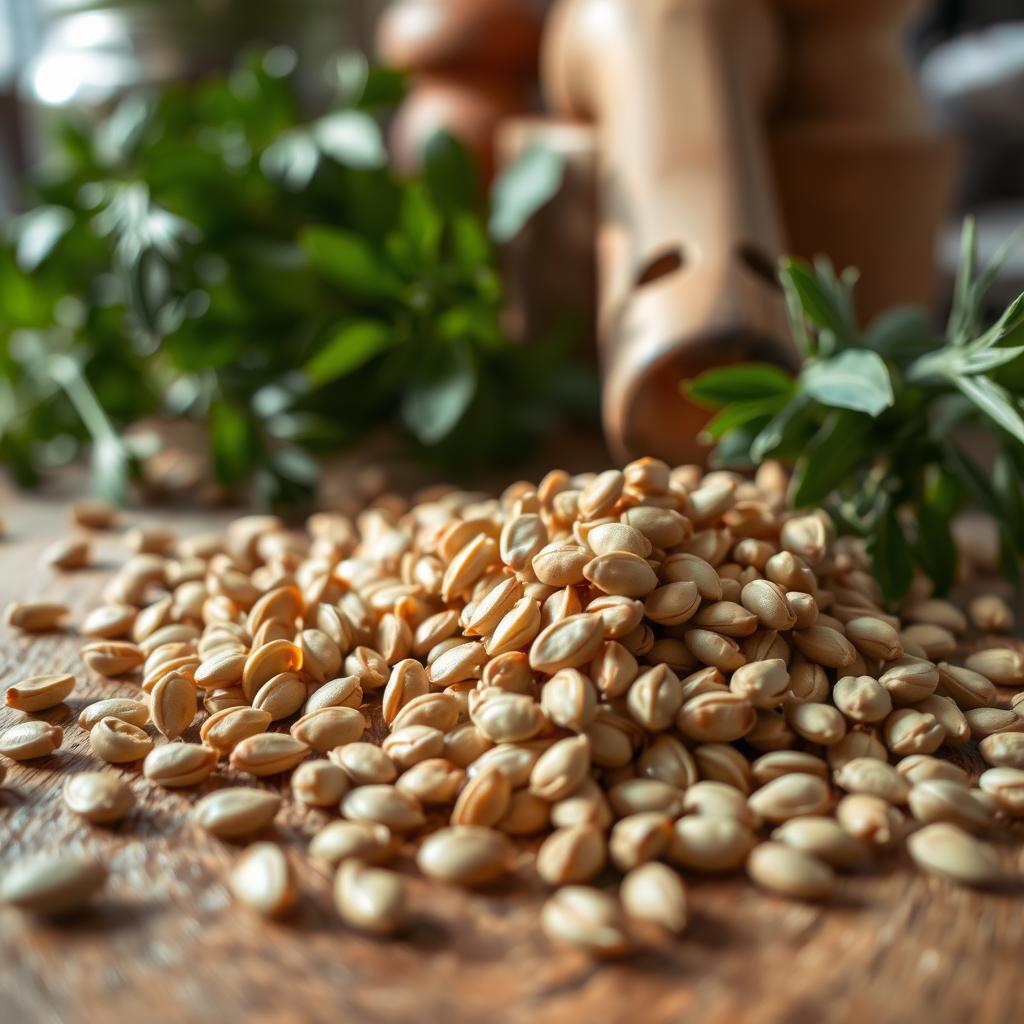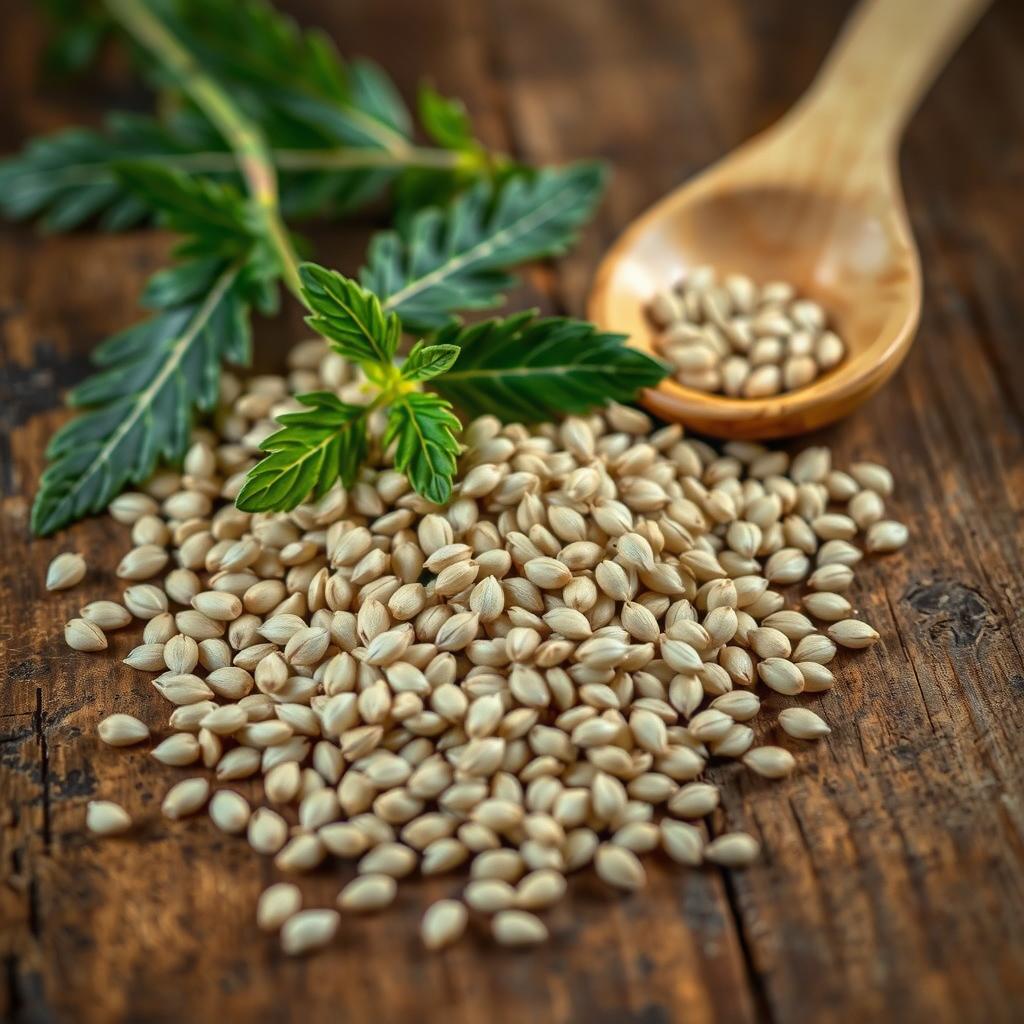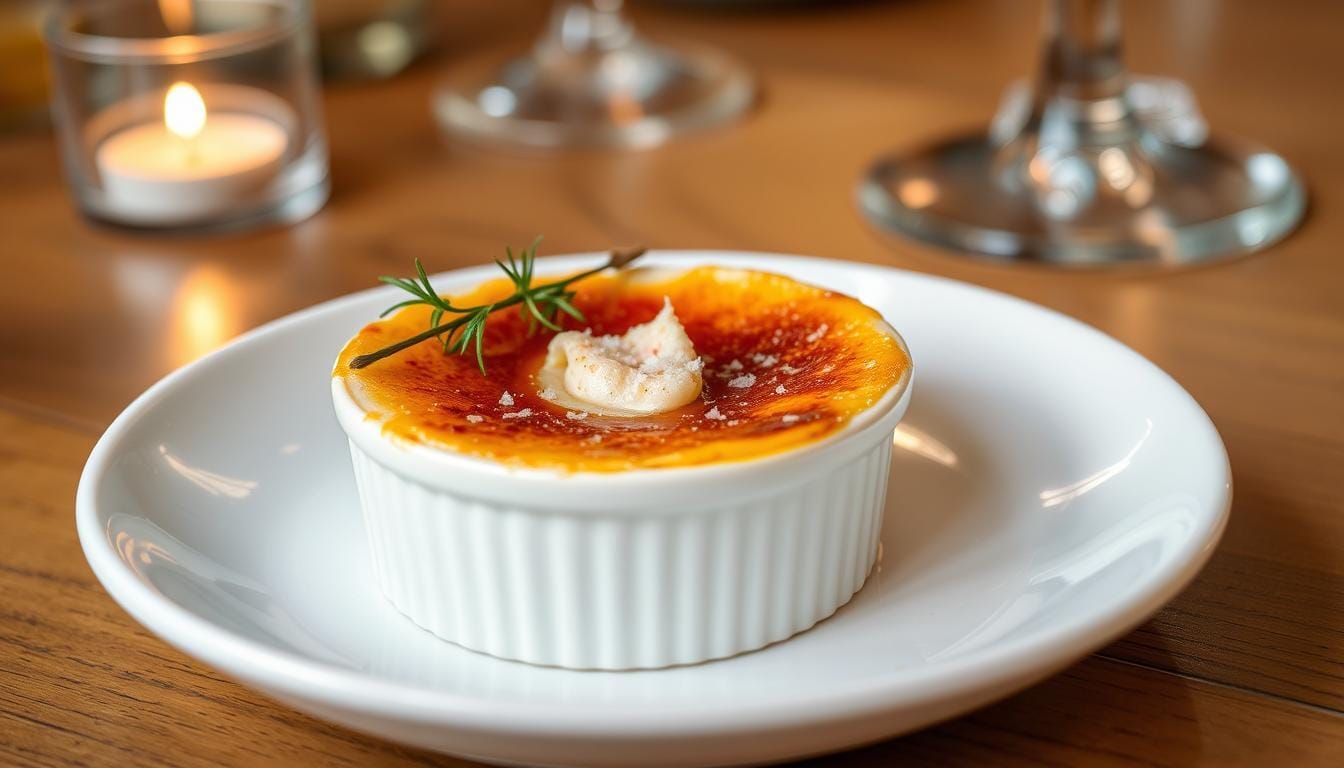The smell of freshly ground caraway seeds takes you back to cozy European kitchens. There, cooks for generations have used this spice to add depth and complexity to their dishes. As a home cook, I love the unique taste of caraway. I’m excited to show you how it can make your cooking better.
Key Takeaways
- Caraway seeds offer a range of health benefits, including digestive support and anti-inflammatory properties.
- Originating in Europe, caraway has been used in traditional dishes for centuries, adding distinctive flavor and aroma.
- The seeds are versatile in the kitchen, suitable for both savory and sweet applications, from breads and stews to roasted vegetables.
- Proper storage and preparation techniques can help you get the most out of caraway’s flavor-enhancing potential.
- Understanding caraway’s unique taste profile can help you pair it effectively with other ingredients for delicious results.
What Are Caraway Seeds and Their Origin
Caraway seeds, also known as caraway, come from the Carum carvi plant. This plant is a biennial herb from Europe and Western Asia. These seeds have a rich history in many cuisines and cultures.
Historical Background
The use of caraway seeds goes back thousands of years. Ancient civilizations like Egypt, Greece, and Rome used them. In the Middle Ages, caraway spice was key in European cooking, especially in breads and stews.
Botanical Classification
Caraway seeds belong to the Apiaceae family. This family includes herbs like dill and cumin. The Carum carvi plant has feathery leaves and crescent-shaped caraway seeds.
Growing Regions
Now, caraway seeds are mainly grown in Northern and Central Europe. The Netherlands, Germany, and Poland are big producers. They also grow in Asia, North Africa, and North America, adapting to different climates.
| Top Caraway Seed Producing Countries | Annual Production (Metric Tons) |
|---|---|
| Netherlands | 25,000 |
| Germany | 22,000 |
| Poland | 18,000 |
| Russia | 15,000 |
| United Kingdom | 10,000 |
Caraway seeds are a big part of many caraway cuisine traditions worldwide.

Nutritional Value and Health Properties
Caraway seeds are more than just a tasty ingredient. They are packed with vitamins, minerals, and fiber. These tiny seeds offer a lot of nutritional value that can help your health.
Caraway seeds are high in fiber. Just one tablespoon has almost 3 grams of fiber. This makes them great for your digestive health and regular bowel movements.
| Nutrient | Amount per Tablespoon (5g) |
|---|---|
| Calories | 20 |
| Total Fat | 1g |
| Carbohydrates | 3g |
| Fiber | 3g |
| Protein | 1g |
| Calcium | 25mg |
| Iron | 0.5mg |
| Magnesium | 6mg |
Caraway seeds are also full of antioxidants. These help fight off harmful free radicals in the body. They may help prevent diseases like cancer and heart disease. The caraway flavor and caraway aroma in these seeds may also help with inflammation. This could be good for digestive issues or other inflammatory conditions.
“Caraway seeds are a rich source of essential vitamins and minerals, including vitamin C, vitamin B6, and iron, making them a nutritious addition to any diet.”
If you want to boost your digestive health or just enjoy the caraway flavor and caraway aroma, try adding caraway seeds to your meals. It’s a simple way to improve your health.

Understanding Caraway Seeds’ Distinctive Flavor Profile
Caraway seeds are known for their amazing aroma and strong flavor. They can make many dishes better. Exploring these seeds shows why they’re so valued in cooking.
Aroma Characteristics
The caraway aroma is a mix of earthy and sweet smells. This comes from oils like carvone and limonene. These oils make the seeds’ scent very appealing.
The smell of caraway is strong. It makes a big difference in both savory and sweet dishes.
Taste Components
Caraway flavor has a mix of tastes. It has a warm, nutty taste with hints of citrus and anise. This mix makes caraway great for many recipes, from baked goods to roasted veggies.
Flavor Pairings
Caraway is great because it goes well with many flavors. It’s especially good with cabbage, potatoes, rye bread, and sauerkraut. This is why it’s so common in European cooking.
Caraway also adds depth to dishes with dairy, legumes, and even sweet fruits like apples and plums.
| Flavor Pairing | Culinary Application |
|---|---|
| Cabbage | Sauerkraut, coleslaw, braised cabbage dishes |
| Potatoes | Roasted potatoes, potato salad, potato pancakes |
| Rye Bread | Pumpernickel, rye bread, seeded bread |
| Dairy Products | Cheese, yogurt, sour cream, butter |
| Apples and Plums | Apple pie, plum compote, fruit chutneys |
“Caraway seeds are a versatile and essential ingredient in many traditional European dishes, adding a unique and delightful flavor that can’t be replicated by any other spice.”
Essential Benefits of Caraway Seeds in Your Diet
Caraway seeds are a tasty and versatile spice. They add flavor to your meals and are packed with nutrients. These small seeds can boost your health and happiness.
Caraway seeds can help with digestion. They contain compounds like carvone and limonene. These help make digestive enzymes and bile flow better, improving nutrient absorption and reducing bloating or constipation.
- Caraway seeds have fiber, which helps with bowel movements and a healthy digestive system.
- Their antispasmodic properties may also ease symptoms of irritable bowel syndrome (IBS) and other gut issues.
Studies also show that eating caraway culinary seeds can help with weight management. The oils in these seeds can increase metabolism and reduce hunger. This makes them great for losing or keeping weight.
“Incorporating caraway seeds into your diet can be a simple yet effective way to support your overall health and well-being.”
Caraway seeds are also full of antioxidants, antimicrobial agents, and anti-inflammatory compounds. These nutrients can boost your immune system, lower the risk of chronic diseases, and ease inflammation.
Caraway seeds can be used in many ways, like on food, in baked goods, or as tea. Their benefits for digestion, weight, and overall health are clear. Try them out and see how they can improve your life.
Popular Culinary Applications
Caraway seeds are a big deal in European cooking. They’re found in many traditional dishes. From German rye bread and sauerkraut to Scandinavian stews and roasted meats, they’re a key part of the region’s food history.
Traditional European Dishes
In Central and Eastern Europe, caraway is a must-have in many dishes. Here are some examples:
- Rye bread and pumpernickel
- Sauerkraut and other fermented veggies
- Goulash and other meat stews
- Roasted pork and beef
- Potato pancakes and dumplings
Modern Cooking Uses
Caraway seeds are not just for old recipes. They’re also popular in modern cooking. Today, they’re used in:
- Artisanal breads and crackers
- Roasted root veggies
- Salad dressings and marinades
- Herbal teas and infusions
- Flavored oils and vinegars
Baking Applications
In baking, caraway seeds really stand out. Their warm, earthy flavor is great in many baked goods. Here are some examples:
| Baked Good | Caraway Pairing |
|---|---|
| Rye bread | A classic combination |
| Crackers and flatbreads | Adds texture and flavor |
| Savory pastries | Complements fillings like cheese or meat |
| Cookies and cakes | Provides a subtle, distinctive taste |
How to Store and Prepare Caraway Seeds
Storing and preparing caraway seeds right is key to bringing out their flavor in your cooking. Here’s how to keep your caraway spice and caraway seasoning fresh and flavorful.
Storing Caraway Seeds
Keep the aroma and potency of your caraway seeds by storing them in an airtight container. Place it in a cool, dark spot like a pantry or spice cabinet. Avoid direct sunlight, heat, and moisture to keep their flavor strong. Whole caraway seeds can stay fresh for up to 6 months if stored properly.
Preparing Caraway Seeds
- Toasting: Lightly toasting the caraway seeds in a dry skillet over medium heat for 2-3 minutes can enhance their nutty, earthy flavors.
- Grinding: Use a spice grinder or mortar and pestle to grind caraway seeds into a fine powder. This intensifies their flavor in baked goods and sauces.
- Whole Seeds: Add whole caraway seeds to stews, sauerkraut, and breads for a delightful crunch and unique taste.
| Preparation Method | Culinary Applications |
|---|---|
| Toasted | Rye bread, sauerkraut, roasted vegetables |
| Ground | Baked goods, sauces, marinades |
| Whole | Stews, breads, sauerkraut |
By following these tips, you can keep your caraway seeds, caraway spice, and caraway seasoning fresh and flavorful. This will enhance your dishes with their unique aroma and taste.
Substitutes and Alternatives
Caraway seeds add a unique flavor to many dishes. But sometimes, you might need a substitute. This could be due to dietary needs, availability, or personal taste. There are several options that can mimic caraway’s caraway flavor and caraway aroma.
Similar Spices
Looking for a spice like caraway? Try these:
- Cumin: Cumin has an earthy, nutty taste similar to caraway. It’s great in savory dishes.
- Fennel seeds: Fennel seeds have a licorice-like flavor. They’re good in baked goods and stews.
- Anise seeds: Anise seeds taste like licorice but are sweeter than caraway.
Flavor Replacements
Without the mentioned spices, you can still get the caraway flavor and caraway aroma. Try mixing:
- Diced chicken recipes with ground coriander or celery seed
- Ground ginger and a pinch of black pepper
- Ground cinnamon and allspice
Remember, it’s all about experimenting to find the right mix of flavors. This will help you achieve the taste you want in your dish.
“Substituting spices can be a fun way to explore new flavor combinations and put your culinary creativity to the test.”
With a bit of experimentation, you can find the perfect caraway seasoning substitutes. They’ll meet your culinary needs and preferences.
Common Mistakes When Using Caraway Seasoning
Caraway seeds add depth and complexity to many dishes. But, they can overpower other flavors if not used right. To make the most of caraway seasoning, avoid a few common mistakes in your caraway culinary creations.
Overusing Caraway Seeds
One big mistake is adding too much caraway dishes. Caraway seeds have a unique, slightly sweet flavor. Start with a small amount, like 1/2 to 1 teaspoon, and adjust to taste.
Failing to Toast the Seeds
Toasting caraway seeds enhances their aroma and flavor. It releases the essential oils, bringing out the spice’s nutty and licorice-like notes. Toast them gently over low heat, stirring often, until fragrant and lightly browned.
Incorrect Pairing with Other Ingredients
Caraway seeds pair well with sauerkraut, rye bread, and root vegetables. But, avoid using them with strong flavors. This way, the caraway won’t get lost or create an unpleasant taste.
| Ingredient | Compatibility with Caraway |
|---|---|
| Sauerkraut | Excellent |
| Rye Bread | Excellent |
| Root Vegetables (Carrots, Parsnips, Potatoes) | Good |
| Citrus Fruits | Poor |
| Seafood | Poor |
By avoiding these common mistakes, you can fully enjoy caraway seasoning. You’ll create delicious, balanced dishes that highlight the spice’s unique flavors.
Conclusion
Caraway seeds are a versatile and flavorful ingredient. They deserve a spot in your kitchen. From their rich history to their nutritional benefits and caraway recipes, they offer endless possibilities.
Use them on baked goods, in sauces, or in savory dishes. These tiny seeds can make your food stand out. Try new things and see how caraway can change your favorite recipes.
Keep exploring with caraway seeds in your cooking. Understanding their unique flavor is key. With a bit of practice, you’ll master using this amazing spice.
FAQ
What are caraway seeds and where do they come from?
Caraway seeds come from the Carum carvi plant, part of the parsley family. They are from Europe and Asia. People have grown and used them in cooking for many years.
What are the health benefits of caraway seeds?
Caraway seeds are full of fiber, minerals, and antioxidants. They help with digestion, reduce inflammation, and might help with weight management.
How do caraway seeds taste and what do they smell like?
Caraway seeds have a unique smell and taste. They smell earthy and taste slightly sweet, nutty, and peppery. Their flavor is like cumin or fennel.
How can you use caraway seeds in cooking?
Use caraway seeds in European dishes, like rye bread, sauerkraut, stews, and cheeses. They’re also good in baking, pickling, and as a flavor for roasted meats and veggies.
How do you store and prepare caraway seeds?
Keep caraway seeds in a sealed container in a cool, dark spot. To use, grind, toast, or add them whole to your recipes. Grinding or toasting brings out their flavor.
What can I use as a substitute for caraway seeds?
If you’re out of caraway seeds, try cumin, fennel seeds, or anise seeds. They won’t taste exactly the same, but they’re close.
How can I avoid common mistakes when using caraway seeds in cooking?
Use caraway seeds carefully, as they can overpower dishes. Start with a little and adjust as needed. Also, avoid burning or overcooking them to prevent bitterness.


